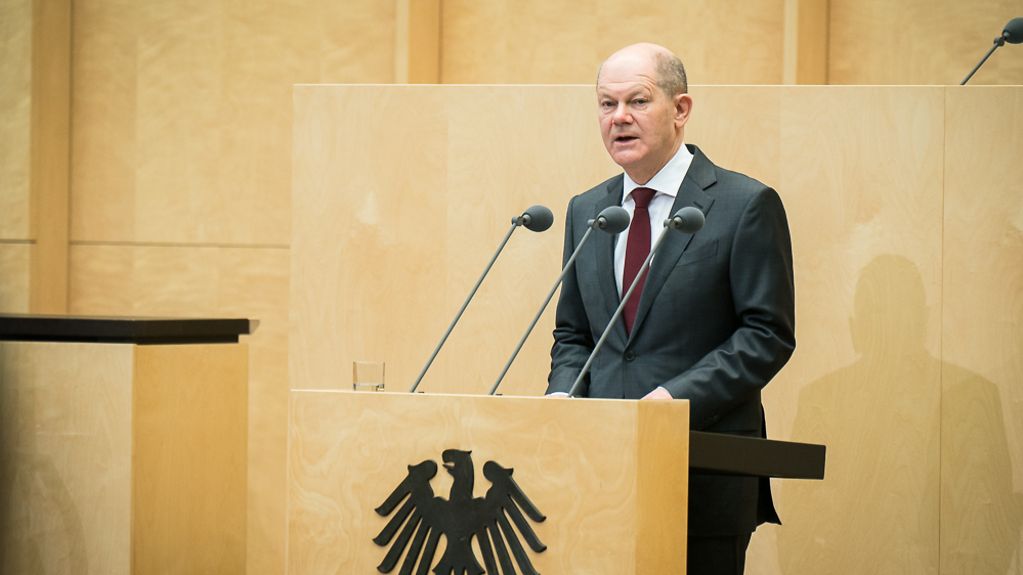Federal Chancellor Scholz in the Bundesrat
Federal Chancellor Olaf Scholz gave his inaugural speech to the Bundesrat. He said that in view of developments in the pandemic, initial steps to ease restrictions would be considered. Furthermore, Scholz praised cooperation with the Länder, which he said was one of Germany’s strengths.
3 min reading time

In the Bundesrat on Friday, Federal Chancellor Olaf Scholz held out the prospect of initial steps to ease restrictions as a pandemic exit strategy.
Photo: Bundesregierung/Kugler
“The way the pandemic is developing allows us to consider initial steps to ease restrictions,” said Federal Chancellor Olaf Scholz in his inaugural speech to the Bundesrat on Friday. “But we must continue to be vigilant and protect those who are most vulnerable. The last thing we want is to jeopardise the success we have achieved to date.”
The Federal Chancellor also noted the importance of vaccination in the fight against the coronavirus pandemic: “Vaccination remains the only way out of the crisis.” He said the government would continue to do everything it could to convince people of the effectiveness of vaccination, advocating not only a vaccine mandate for health workers but compulsory vaccination for the population as a whole, too.
Joint action is important
Germany’s federal structure had proven effective in the pandemic, said Scholz, noting that largely uniform restrictions now applied throughout the country. This was important when it came to securing acceptance among the population and had enabled Germany to get through the crisis relatively well. “We should definitely preserve this political culture,” he said. Scholz emphasised the importance of good Federation-Länder relations, especially in the current situation. The Bundesrat was the “heart of federalism,” he said, and was one of the key reasons for Germany’s strength. “The culture of bridge-building is good for our political system and for our society.”
Transformation for the future
But it was also important to learn lessons from the pandemic for the future, said Scholz. The resilience of the healthcare system had to be improved, he said. The Federal Government has committed to developing a preventive, crisis-proof and modern system of healthcare. Looking to the future, the Federal Chancellor said: “The second industrial revolution lies ahead of us”. He outlined the plans for an emergency climate action programme and an alliance for transformation. “Together with the private sector, the trade unions and the associations, we will seek to establish a stable and reliable framework.”
Equal living conditions
“We still have to get much closer to achieving the goal of equal living conditions,” said Scholz. Not everything had to be the same everywhere, he said, but it was important for citizens to have comparable opportunities in all areas of the country. “This is a question of respect for the many capable people up and down our country. We will continue to develop and strengthen the nationwide support scheme for structurally weak regions with the aim of improving the prospects for the regions,” said the Federal Chancellor. This was why he had assigned responsibility for East-West relations directly to the Chancellery, he said.
Peace is worth every effort
In addition to the domestic policy agenda, Federal Chancellor Scholz also addressed the foreign policy situation. “Securing peace in Europe is worth every effort,” said the Federal Chancellor. Many citizens were very concerned about the troop deployments along the border to Ukraine, he said. Scholz once again stressed the unity among the allies, emphasising the clear message to Russia that any military aggression would have very severe consequences.